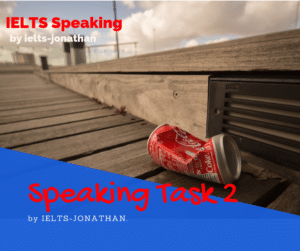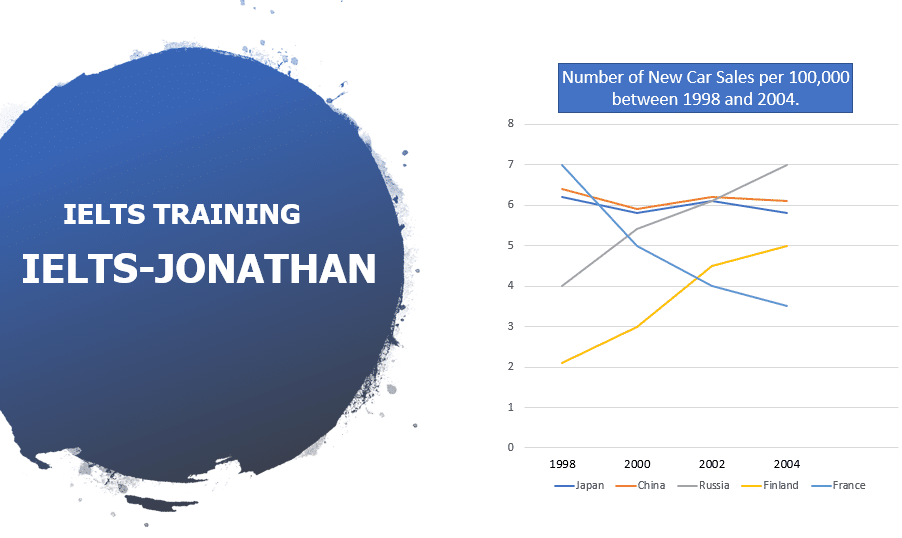Did you know that the second part of the IELTS Speaking test can be the most difficult for candidates, even Native Speakers.
But don’t despair it can also be the easiest part, and the most enjoyable.
There is a valid reason for this part of the IELTS test, and I will explain this below.
One reason for Part 2 is to allow the candidate speak at length and meet the fluency criteria.
A second reason is to allow the examiner to grade your ability for the follow up questions in Part 3.
They are trained to listen carefully for language range, grammar accuracy and pronunciation is normal speech.
They can then chose the best question sets in Part 3 that allows you to display your real language ability. So it’s important to fill that 2 minutes the best you can.
Part 2 Structure
You are given a set of prompts and a question.
The prompts are not particularly challenging, but follow a pattern to give you ‘ideas’ and ‘structure’ for your 2 minute talk.
This gives the examiner ‘a further opinion‘ to your level, ready for Part 3.
One way to do well in this section is to try and relax.
A relaxed candidate always performs better and responds well.
If you don’t understand something, always ask the examiner to repeat the prompt question.
The examiner can’t help you directly, but repetition might help you understand the prompt better.
Other tips are
- Don’t give the examiner an opportunity to ask ‘can you say anything else about that’.
- Speak for the full 2 minutes until the examiner stops you.
- Don’t hesitate too much, you are allowed to make some mistakes, it’s natural.
- Connect your sentences and use the structure given in the prompt.
- Attempt to use complex sentences rather than short, simply ones.
and
- Don’t be afraid to correct yourself.
What if you really don’t understand the prompt or even worse the prompt doesn’t apply to you?
If you’re preparing for IELTS, and feel you cannot answer some of the speaking questions properly, simply because they really do not apply to your current life experience, then don’t worry as you’re not alone.
For example:
Q. Talk about an object you own that is especially valuable or important to you.
Problem: I have a quite spartan lifestyle and I don’t have any emotional attachment to any objects I own.
Q. Talk about an object that has had great influence in your life, and explain how it influenced your life.
Problem: While I could talk for hours about books that I love, I don’t really feel that there is a book that has truly influenced my life.
IELTS Speaking Topic: A law in your country
Describe a good law in your country.
You should say:
what the law is
how you first learned about this law
who benefits from this law (or, who is affected by this law)
and explain why you think this is a good law.
Well, I’d like to talk about the law which has been introduced in an attempt to cut the use of the plastic bags. Several years ago, the British government approved a law to reduce the excessive consumption of plastic bags. They introduced this law as it was suggested that plastic bags were a main source of visible pollution. I think this is obvious because these bags aren’t degradable and this kind of plastic is easily blown by the wind. So, it was easy to find these bags in rivers, ponds and bushes. Another point, was that plastic bags were often used only once before being discarded and this was another good reason to discourage their use.
So, the central government followed the lead of Wales and introduced a 5 pence charge, which has recently risen to 10 pence, to try and reduce the demand for single-use carrier bags because this plastic takes centuries to degrade.
Consequently, it seems that things are improving and there are encouraging signs. There have been other campaigns, such as a ‘Bag for Life’ by major supermarkets where consumers have been encouraged to purchase durable, reusable bags, while some large supermarket chains, such as Asda, have introduced a charge for biodegradable bags and they give rewards to customers who bring their own bags to the store.
I believe it’s really noticeable now that there is a lack of plastic bags seen in the streets, but sadly other rubbish is now more noticeable too. I think it was a very good law and I feel that more initiatives should be introduced to combat this social problem of plastic waste and others types of waste too.
Solution to this problem
IELTS is a test of your language ability, not intelligence or knowledge.
You may think the IELTS test is an interrogation, but you don’t really need to answer with the truth.
However, I would feel more comfortable with the be honest approach, even if it does not directly answer the question.
You would probably be able to answer more naturally, and therefore be more fluent.
Which one do you think is a better strategy?
You can use tips and information on this website to help make it easier to obtain a higher score, but remember you still need to work at learning the language to be successful.
Please share to someone you know and in the meantime take a look at my Facebook Page and Website for IELTS answers and you can also join my Facebook Group here too.
Good Luck
Jonathan
I’m Jonathan
I’ve taught IELTS and University English in more than a dozen universities and schools around the world.
I’m a parent, traveller and passionate about language teaching and helping students achieve their dreams.
Whilst living in Austria or working in Asia, I run IELTS courses to help students get to where they want to be.
If you are serious about IELTS, connect with me to see how I can help you.




